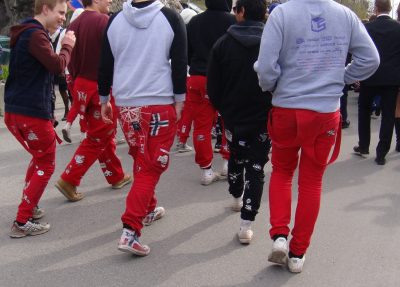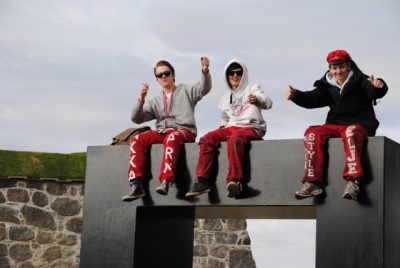NEWS ANALYSIS: As if the Russians weren’t enough to worry about: Fear and loathing have also been running high this spring over Norway’s graduating high school students known as russ (roughly pronounced “roose”). Teachers, health care officials, police and plenty of others are sounding alarms that this year’s russ season can be the most decadent ever, especially since all final exams were cancelled.

“Young people have told us about episodes where things get completely out of hand,” Anita Håndstad Holtan, a school nurse in Ringerike outside Oslo, told newspaper Aftenposten as the russ‘ excessive partying was about to begin earlier this spring. “It can be about drug and alcohol abuse, sexual assaults or friends being excluded from what are supposed to be fun events.”
The exclusion issue has risen in line this year with the amounts of money many graduating teens spend during russ season. The buses they use to ride around in while partying are often outfitted with expensive sound systems and fancy interiors, with costs running well above a million kroner. Ticket prices for various gatherings (called russetreff) have soared, and now it’s not unusual for russ to fly off to Greek islands or elsewhere in Southern Europe to party abroad. Complaints about the russ have swirled for years, but now they’re rising. The russ season, it’s claimed, has become far too commercial, and big business for companies supplying the special clothing or organizing major events or trips.
Peer pressure to the extreme
Not only can all that be beyond the budgets of russ from less affluent familes, but the allegedly “coolest” russ often exclude “less cool” classmates from joining in. Friendships have been shattered and lots of teenagers wind up feeling hurt and lonely. Many of those taking part feel pressured to use drugs or are dared to defy all social boundaries.
“We’ve heard that in some groups now, nearly everyone uses cocaine,” Holtan said. “I don’t think most realize how addictive that can be, or the effect it can have in dealing with others. They can become aggressive and lose all impulse control.”
Russ season has also grown longer, with some groups being formed three years in advance of graduation and already starting to exclude others along the way. Calls are rising for the schools themselves to get more involved in regulating russ season. Until now, schools have not been formally involved in organizing russ events, perhaps since many russ are celebrating the end of obligatory education iin Norway and are tired of school norms and even school work.
The educational issue is at the forefront this year, after state authorities dropped all final exams. They reasoned that Corona containment measures had made it difficult for all schools to get through standard teaching curriculum durnig the past two years, leaving those graduating with varying degrees of preparedness for exams. With no exams to study for, though, there’s been even less classroom motivation this year.

“Why should the students take learning seriously when the authorities don’t?” wrote commentator Therese Sollien in Aftenposten recently. She rightly predicted high absentee rates as russ season (which usually begins in March or April) progressed. Since the russ don’t have to study for exams that usually were held shortly after the 17th of May, they can just keep partying.
Norway’s russ season is extreme even in Scandinavian terms. There are no “cap and gown” ceremonies like in the US and Sollien pointed out that in Denmark, celebrations to mark the end of high school (videregåendeskole) are limited to just one night of being driven around to the homes of familiy and friends for drinks and snacks. In Sweden, high school graduates spend a day or two celebrating with a traditional white cap on their heads. The Norwegians’ tendency to party for weeks on end remains unique.
“Why doesn’t somebody do something about this,” wrote 18-year-old Elisabeth Hekneby in a commentary aimed at youth and adules. She admits how she always thought the russ were exciting, and looked forward be be russ herself one day. Hekneby, who’s politically involved and leads the Oslo chapter of the Conservative Party’s youth group, wants the tradition to continue, but “become even better” by delaying the celebrations until after the school year has actually ended.
“If you’re running a marathon, you don’t stop up 100 meters from the finish line to take a break,” she noted. As russ, she thinks, “we risk a lot” by partying before teaching is over. There was a time when the partying came after exams, but things were switched a few decades ago in a vain effort to dampen the partying.
“The politicians have to get the schools on the right track,” wrote Helle Christin Nyhuus, leader of the teachers’ organization Norsk Lektorlag, in yet another recent commentary. She claims teachers have warned for years that learning stops as soon as the high school seniors put on their red or blue russ overalls. The entire russ season “steals massive time and resources” from the schools, she believes, and comes at a high price for those trying to hang out with the “in-crowd,” scrape together enough money to do so and risk losing friends.
Parents are also being called upon to pay attention to what their offspring are doing during russ, and how they’re behaving. Many parents claim they had no idea how destructive the partying can be, or perhaps didn’t want to know.
The season reaches its climax on the 17th of May. It remains unclear whether two years of cancelled socializing during Corona will spark even wilder partying or whether many teenagers have grown used to staying home and won’t be so wild after all.
Sociologist Willy Pedersen, a professor at the University of Oslo, believes the russ season reveals tension in society as a whole. He notes that the Norwegian tradition started back in 1813, when some young men from elite families in Oslo were admitted as students to a new university when the city was still called Christiania, founded by the ruling Danish. They young men got drunk and wandered up and down streets celebrating, a ritual tied to European universities since the Middle Ages called cornua depositurus. The word russ derives from the last syllable and symbolizes how horns schoolboys had worn had to be torn off before they would be allowed into academia.
Elite tradition lives on
The ritual changed character at the end of the 1800s, to instead mark how preparations for university were ending. It was still mostly the elite who could prepare for or attend university, whereas now the vast majority do, and most of them feel they deserve to party with abandon after 13 years of schooling.
It’s still the elite, however, who party hardest and with all the decadence that alcohol, drugs and not least the russ‘ buses can create. Children from affluent families still experience the “most intense” russ season, according to Pedersen. Some changes are emerging, though, with some “urban cool” russ in Oslo now opting to sew their own overalls or other russ costumes, ride on the metro instead of in loud and fancy buses, and host parties in large locations where most everyone can afford to join in.
Pedersen also notes that the “russ bus phenomenon” is far more prevalent in Southern Norway than in Northern Norway and, within Oslo, much more common in the affluent west and suburban Bærum than in the more working-class eastern districts. Those subjected to the throbbing music from a russ bus driving by, meanwhile, mostly look forward until it’s all just over.
newsinenglish.no/Nina Berglund

